仁爱英语九年级上Unit1课件
- 格式:ppt
- 大小:1.24 MB
- 文档页数:21
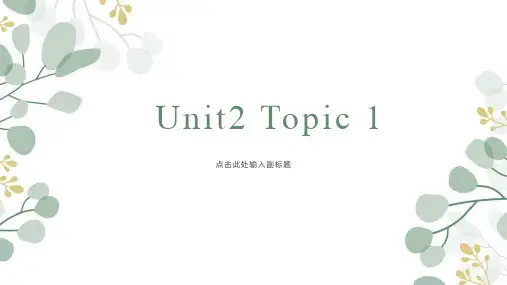
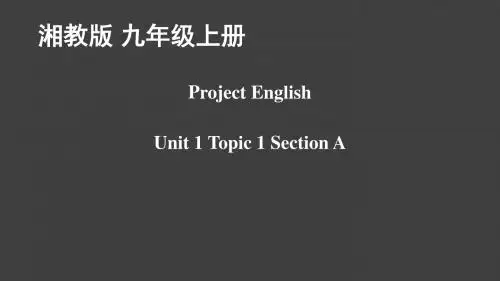
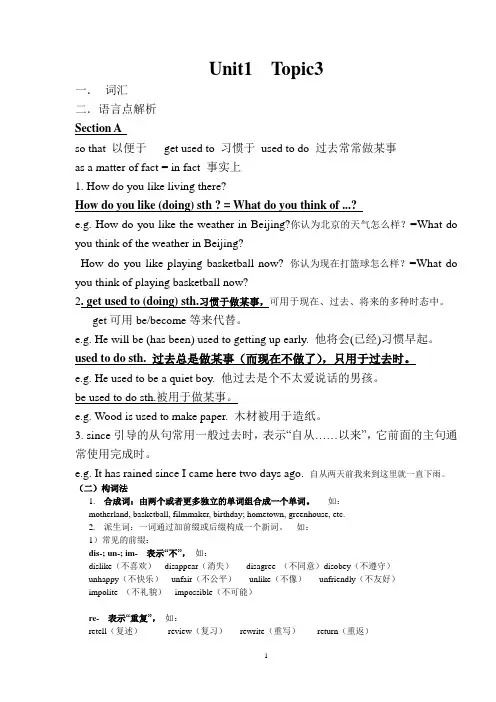
Unit1 Topic3一.词汇二.语言点解析Section Aso that 以便于get used to 习惯于used to do 过去常常做某事as a matter of fact = in fact 事实上1. How do you like living there?How do you like (doing) sth ? = What do you think of ...?e.g. How do you like the weather in Beijing?你认为北京的天气怎么样?=What do you think of the weather in Beijing?How do you like playing basketball now? 你认为现在打篮球怎么样?=What do you think of playing basketball now?2. get used to (doing) sth.习惯于做某事,可用于现在、过去、将来的多种时态中。
get可用be/become等来代替。
e.g. He will be (has been) used to getting up early. 他将会(已经)习惯早起。
used to do sth. 过去总是做某事(而现在不做了),只用于过去时。
e.g. He used to be a quiet boy. 他过去是个不太爱说话的男孩。
be used to do sth.被用于做某事。
e.g. Wood is used to make paper. 木材被用于造纸。
3. since引导的从句常用一般过去时,表示“自从……以来”,它前面的主句通常使用完成时。
e.g. It has rained since I came here two days ago. 自从两天前我来到这里就一直下雨。
(二)构词法1.合成词:由两个或者更多独立的单词组合成一个单词。
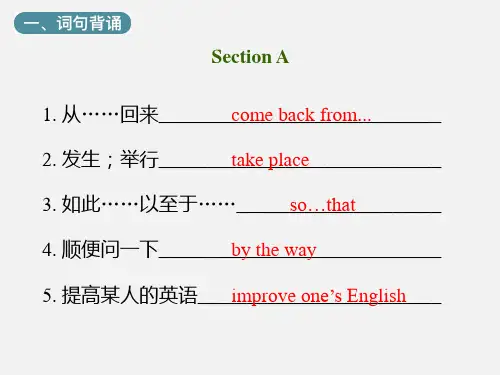
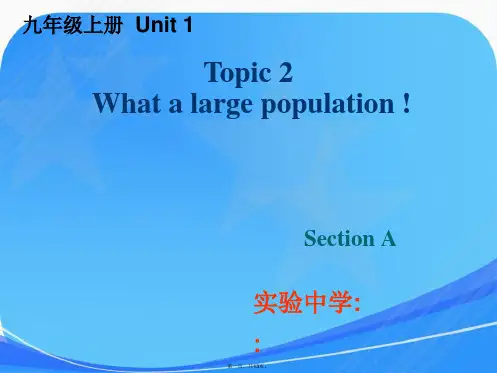

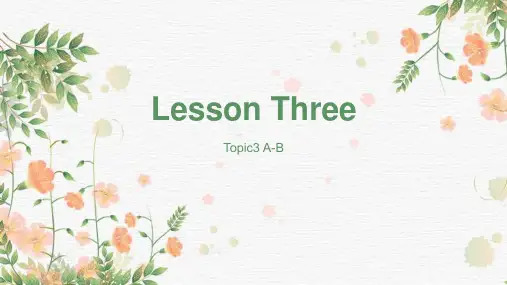
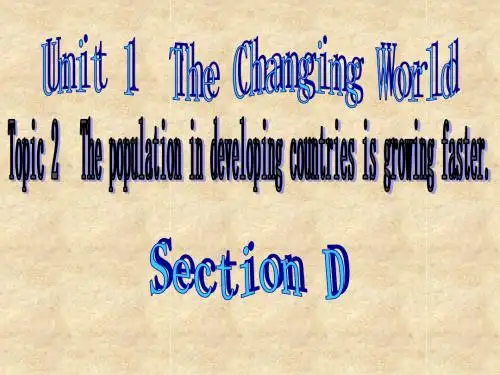
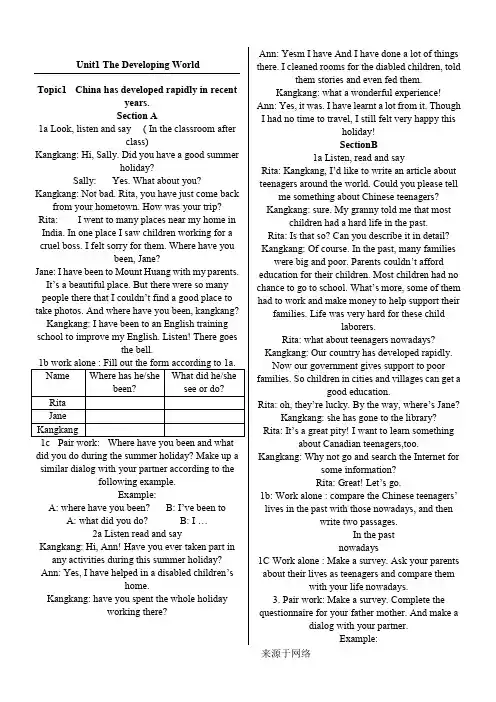
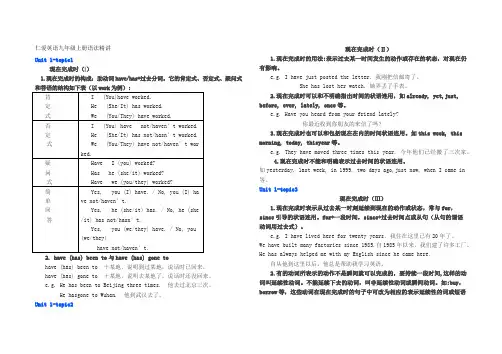
1.现在完成时的用法:表示过去某一时间发生的动作或存在的状态,对现在仍有影响。
e.g. I have just posted the letter. 我刚把信邮寄了。
She has lost her watch. 她弄丢了手表。
2.现在完成时可以和不明确指出时间的状语连用,如already, yet,just,before, ever, lately, once等。
e.g. Have you heard from your friend lately?你最近收到你朋友的来信了吗?3.现在完成时也可以和包括现在在内的时间状语连用。
如this week, thismorning, today, thisyear等。
e.g. They have moved three times this year. 今年他们已经搬了三次家。
4.现在完成时不能和明确表示过去时间的状语连用。
如yesterday, last week, in 1999, two days ago,just now, when I came in等。
Unit 1-topic3现在完成时(Ⅲ)1.现在完成时表示从过去某一时刻延续到现在的动作或状态,常与for,since引导的状语连用。
for+一段时间,since+过去时间点或从句(从句的谓语动词用过去式)。
e.g. I have lived here for twenty years.我住在这里已有20年了。
We have built many factories since 1985.自1985年以来,我们建了许多工厂。
He has always helped me with my English since he came here.自从他到这里以后,他总是帮助我学习英语。
2.有的动词所表示的动作不是瞬间就可以完成的,要持续一段时间,这样的动词叫延续性动词。
不能延续下去的动词,叫非延续性动词或瞬间动词。

B9 Unit 1 The Changing WorldTopic 1 Our country has developed rapidly一、Read the passage and answer the questionsChanges in BeijingI’m Kangkang. For this report I have interviewed my grandmother. She has lived in Beijing for more than forty years. She has seen the changes in Beijing herself.In the 1960s , the living conditions in the city were poor. The roads were narrow and there weren’t many ringroads. Big families were crowded into small houses. Many families couldn’t get enough food. Few children had the chance to receive a good education. People had little money to see a doctor. And there were few hospitals. People kept in touch with their friends relatives far away mainly by letter or telegram.China has developed rapidly since the reform and opening-up. More and more ring roads and subways have appeared and buildings in Beijing are becoming taller and brighter. People’s living conditions have improved a lot. And there are more kinds of food and clothes to satisfy people’s needs. Children can study not only in modern schools but also on the Internet. People can enjoy good medical care.What’s more, communications are becoming easier and quicker---people can use telephones, cellphones, fax machines and the Internet.Beijing has made rapid progress and it has already succeeded in hosting the 2008 Olympic Grames. I think it is important to remember the past, live in the present and dream about the future.(1) 1. What were the living conditions in Beijing like in the past? Give some examples.2. Did many children have the chance to receive a good education?3. How did people keep in touch with their friends and relatives far away?4. What has happended to Beijing nowadays?5. What can people use to communicate now?6. Do you think it is important to remember the past , live in the present and dream about the future?(2)词汇过关1. 狭窄的________2. 通讯_____________3.各种各样的_________4.亲戚_________5. 自…以来________6. 使满意____________7. 医疗的_________8. 进步___________9. 成功地做某事_________________ 10.已经________11.高兴的__________ 12. 迅速的_________13. 手机___________ 14. 报告__________ 15. 电报___________ 16. 传真机____________二、在文中画出下列短语并翻译。